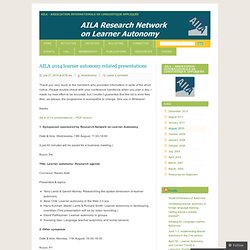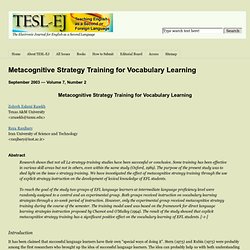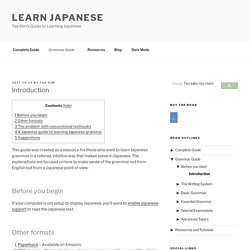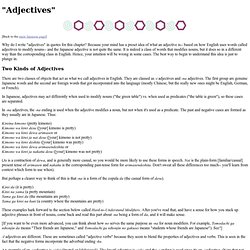

SLA digital video. AILA 2014 learner autonomy related presentations. July 27, 2014 at 6:59 am renautonomy Thank you very much to the members who provided information in spite of the short notice.

Please double-check with your conference handbook when you plan a day. I made my best effort to be accurate, but I couldn’t guarantee that the list is error free. Also, as always, the programme is susceptible to change. Ideal L2 Self. Elgort 1 assessment. Conceptualising Learning in Applied Linguistics. Contributions of Vygotsky's Theory to Second Language Acquisition. A Summary of Stephen Krashen's "Principles and Practice in Second Language Acquisition" Vygotsky Second Language Acquisition, free PDF download. Teaching and SLA. Metacognitive Strategy Training for Vocabulary Learning. September 2003 — Volume 7, Number 2 Zohreh Eslami Rasekh Texas A&M University <zrasekh@tamu.edu> Reza Ranjbary Iran University of Science and Technology <ranjbary@iust.ac.ir> Abstract Research shows that not all L2 strategy-training studies have been successful or conclusive.

Some training has been effective in various skill areas but not in others, even within the same study (Oxford, 1989). Introduction It has been claimed that successful language learners have their own “special ways of doing it”. Learning strategies are defined by O’Malley and Chamot (1990) as “special thoughts or behaviors that individuals use to comprehend, learn, or retain new information” (p.1).
In the 1980s and early 90s, research mainly focused on categorizing the strategies found in the studies of the previous decade. Methodologies in Foreign Language Teaching. Principles of L2 Teaching Methods and Approaches. This module provides a description of the basic principles and procedures of the most recognized and commonly used approaches and methods for teaching a second or foreign language.

Each approach or method has an articulated theoretical orientation and a collection of strategies and learning activities designed to reach the specified goals and achieve the learning outcomes of the teaching and learning processes. Jill Kerper Mora The following approaches and methods are described below: Grammar-Translation Approach Direct Approach Reading Approach Audiolingual Approach Community Language Learning The Silent Way The Communicative Approach Functional Notional Approach Total Physical Response Approach. Erin's Challenge! I can speak Japanese. Kanji Cafe. JLPT N3 grammar list. WaniKani, a kanji learning application by Tofugu. How To Identify A Kanji That You Don’t Know. You’re sitting there staring at this (probably ancient alien origin) kanji character, and you have no idea what it means.

Like nada. Nothing. Zilch. No matter how deep your probe your brain nothing will come out. Congratulations. Anyways, I digress. This is by far the easiest. Upon pasting a kanji into the kanji section, you’ll get lots of information about it, including it’s meaning, reading, name-readings, number of strokes, and so much more. How easy. Here’s where it starts to get fun. Jisho.org Radical Search Back to Jisho, again. JLPT Level N3 Kanji List. Kanji Brain: Learn Kanji! The Japanese Slang Jiko. You don't know a language, you live it. You don't learn a language, you get used to it. Japanese Grammar Guide. This guide was created as a resource for those who want to learn Japanese grammar in a rational, intuitive way that makes sense in Japanese.

The explanations are focused on how to make sense of the grammar not from English but from a Japanese point of view. Before you begin If your computer is not setup to display Japanese, you’ll want to enable Japanese support to read the Japanese text. Other formats Paperback – Available on Amazon.PDF Version – Philipp Kerling wrote an awesome script to convert the site to PDF.iOS app – The guide is now available for iOS devices created by Adam Critchley.Android app – The guide is now available on Google Play created by Ignatius Reza Lesmana. This work is released under a Creative Commons Attribution-Noncommercial-Share Alike License. Reviewing the Kanji. Japanese "adjectives" [Back to the main Japanese page] Why do I write "adjectives" in quotes for this chapter?

Because your mind has a preset idea of what an adjective is-- based on how English uses words called adjectives to modify nouns-- and the Japanese adjective is not quite the same. It is indeed a class of words that modifies nouns, but it does so in a different way than the corresponding class in English. Hence, your intuition will be wrong in some cases. The best way to begin to understand this idea is just to plunge in. Two Kinds of Adjectives There are two classes of objects that act as what we call adjectives in English.
In Japanese, adjectives may act differently when used to modify nouns ("the green table") vs. when used as predicates ("the table is green"), so these cases are separated. Japanese grammar. Some distinctive aspects of modern Japanese sentence structure[edit] Word order: head final and left branching[edit] The modern theory of constituent order ("word order"), usually attributed to Joseph Greenberg, identifies several kinds of phrase. Each one has a head and possibly a modifier. The head of a phrase either precedes its modifier (head initial) or follows it (head final). Some of these phrase types, with the head marked in boldface, are: genitive phrase, i.e., noun modified by another noun ("the cover of the book", "the book's cover");noun governed by an adposition ("on the table", "underneath the table");comparison ("[X is] bigger than Y", i.e., "compared to Y, X is big").noun modified by an adjective ("black cat").
MangaTribe Japanese Onomatopoeia. Free Japanese study materials, worksheet, PDF, audio file, list. Japanese Language School in Tokyo. NIHONGO eな - Portal for Learning Japanese - [Beginner] [Reading] Site search.